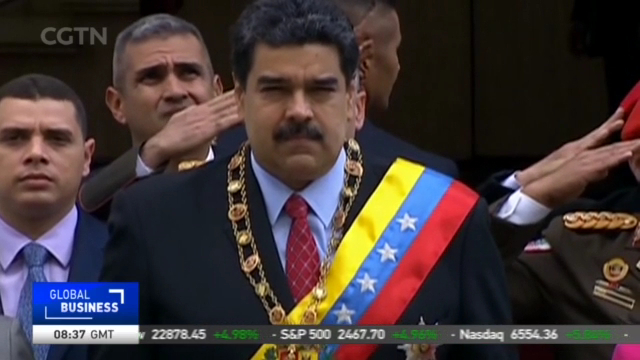
17:07, 27-Dec-2018
Venezuela Economy: Economic meltdown expected to continue in 2019
Updated
16:33, 30-Dec-2018
03:23

2018 has been a year of deep economic crisis for Venezuela. The South American country is experiencing an astonishing rate of hyperinflation, crippling shortages of food and medicine and as a result, a mass exodus. CGTN's Juan Carlos Lamas takes a look back at what it's been like for Venezuelans this year, and the forecast for 2019.
Money, how to get it and what it will buy, two big issues for Venezuelans lining up at cash machines to get bills which lose value by the minute. The IMF predicts hyperinflation in Venezuela will reach a whopping ten million percent next year.
The minimum wage has gone up six times in 2018 alone, yet that salary, the equivalent of just under nine dollars a month won't even buy the few goods available on grocery store shelves.
ANA CEDENO SOCIAL WORKER "Two bananas and seven tomatoes - this is all the food I could buy with my salary for the next month."
The Venezuelan government dropped five zeros off its currency and issued new bills over the summer, but cash shortages continue. Electronic payment methods often fail as well and many people have resorted to bartering.
LETICIA PUERTO HAIRDRESSER "If people do not have the cash to pay, and are unable to do bank transactions, they just pay with food or medicine, which are things we all look for and need."
Venezuela's National Council of Commerce and Services estimates between 40 and 45 percent of businesses across the country have closed down.
And a massive exodus continues. The U.N. estimates three million Venezuelans have fled the country's economic and political chaos since 2015.
This is the fourth year in a row of deepening recession for Venezuela. It began as world oil prices plummeted in 2014.
JUAN CARLOS LAMAS CARACAS "With the world's largest proven oil reserves, Venezuela has for years relied on oil revenue for everything from education to medical care and subsidies for food and gasoline."
President Nicolas Maduro blames Venezuela's economic downturn on the sanctions imposed on Venezuela by other countries.
NICOLAS MADURO PRESIDENT OF VENEZUELA "From 2017 to 2018, a set of measures have been taken to pursue Venezuela's global bank accounts, measures which have kidnapped millions of dollars from Venezuela, money which was going to be used to purchase medicine and food."
Dozens of protests take place across the country every week over the lack of food and medicine, drinking water, electricity, and gasoline.
In January, a new presidential term of six years begins for Nicolas Maduro. His economic recovery plan has so far included a 96 percent devaluation in the exchange rate and an increase of more than three-thousand percent to the minimum wage. Many hungry Venezuelans fear the continuation of such a plan will only sink their country more deeply into economic crisis.
Juan Carlos Lamas, CGTN, Caracas.

SITEMAP
Copyright © 2018 CGTN. Beijing ICP prepared NO.16065310-3
Copyright © 2018 CGTN. Beijing ICP prepared NO.16065310-3